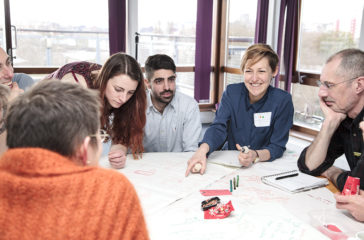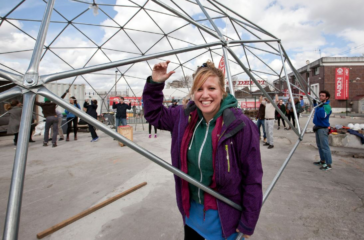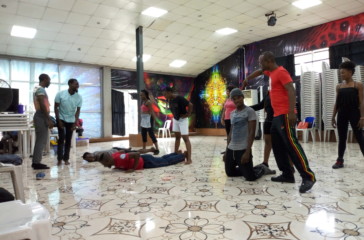Read the third in a series of Q&A’s with participants for Producer Farm 2018, a residency which provides time and space for contemporary performance producers to refresh their current practice, and consider their future potential.
Danielle Rose (London) is a live-performance Producer and Project Manager who has worked with organisations including Southbank Centre, Pavilion Dance South West, and The Dartington Hall Trust. She is passionate about how the creative industries can develop to ensure that people from working-class backgrounds are not excluded by structural barriers and are better enabled to access, participate in and work in the arts.
1. What challenges do you encounter within your area of producing?
One thing I sometimes struggle with in the arts are the time frames that we set ourselves or are left with by default. Often it feels like everyone’s cutting it really fine. There are numerous factors which feed into this, from when funding and partners are secured, to work on other programmes postponing when attention can be given to the next project and when delivery staff are recruited. I have lost track of the amount of times I have been invited to work on a brilliant project but have had a feeling from day one of being months behind schedule or knew that would be the case and so declined.
I won’t even begin to pretend that I have the answer to remedy this complex challenge, but it strikes me that we need to get better at creating the conditions for people to do their best work. A system that always leaves just enough time, or not enough time, favours those who are well-connected, already know the answer, and who can afford to put in extra hours unpaid. This way of working poses more of a challenge for those who are starting out, have caring responsibilities, are struggling with their mental health or who may need more time for certain tasks because of their neurodiversity.
Perhaps that lack of give built into project time frames also means people can be more likely to stick with what they know, taking fewer risks than they would if given a bit more time, for example calling up the same collaborators and not exploring who may be beyond their usual circles. I don’t often see time frames mentioned in diversifying cultural workforce debates, but the more I think about it, perhaps it’s something that should be.
2. Why did you apply for Producer Farm and what do you hope to get out of it?
My CV is populated by such a weird mix of roles, accumulated through sheer curiosity, genuine interest and, also occasionally, through decisions that lacked self-awareness where the fear of falling back into poverty again and want for security made me accept or apply for jobs that really were not meant for me.
I applied for Producer Farm because I’m looking for direction and need some time, space and excellent people to help me work out where to go next. I hope Producer Farm can help me refocus and dream big. Because of my lived experiences, which include poverty and homelessness, I feel that I bring a less represented perspective to the arts and producing, but I feel I am yet to find my voice. Only in the last few years have I found the confidence to start to talk more openly about the Adverse Childhood Experiences that inform my frustrations and passions. I hope that the supportive environment that the residency provides could help me identify how I can carve out a space within the arts to explore and contribute to areas that really matter to me.
3. Can you tell us about an event you have been to which has made you think differently?
A project that has definitely made me think differently is Southbank Centre’s WOW – Women of the World festival. I did some freelance work on it in Autumn last year, supporting the delivery and wrap-up of festivals in Bradford, Exeter and Perth.
During the planning of each festival, a wide cross section of the local population are sought out and invited to contribute ideas and programming suggestions, in sessions called Thinkins. It’s a really effective way of identifying, not assuming, what the most relevant and interesting topics are for each ‘community’.
Working on WOW has also taught me so much about access and better hosting. Staff involved at every level get why facilities and resources like creche facilities, prayer rooms, BSL interpreters and bursaries matter.
WOW was a breath of fresh air for me, as I think that sometimes resource can be poured into events where no one checked in on whether the perceived beneficiaries wanted or needed the outcome, or perhaps failed to create the conditions where the people they wanted to take part actually could. I’ve also worked in other environments which have felt very middle-class and ableist, where it can feel like such a fight internally to get support for certain provisions. WOW has set a bar for me now and made me even more resolute on what to aim for.
Read Danielle’s article on Class and Working in the Arts
Producer Farm is a partnership with Dance Umbrella, Bristol Old Vic FERMENT, Fuel Coombe Farm Studios & In Between Time
Beats Without Boundaries © Tim Arber








